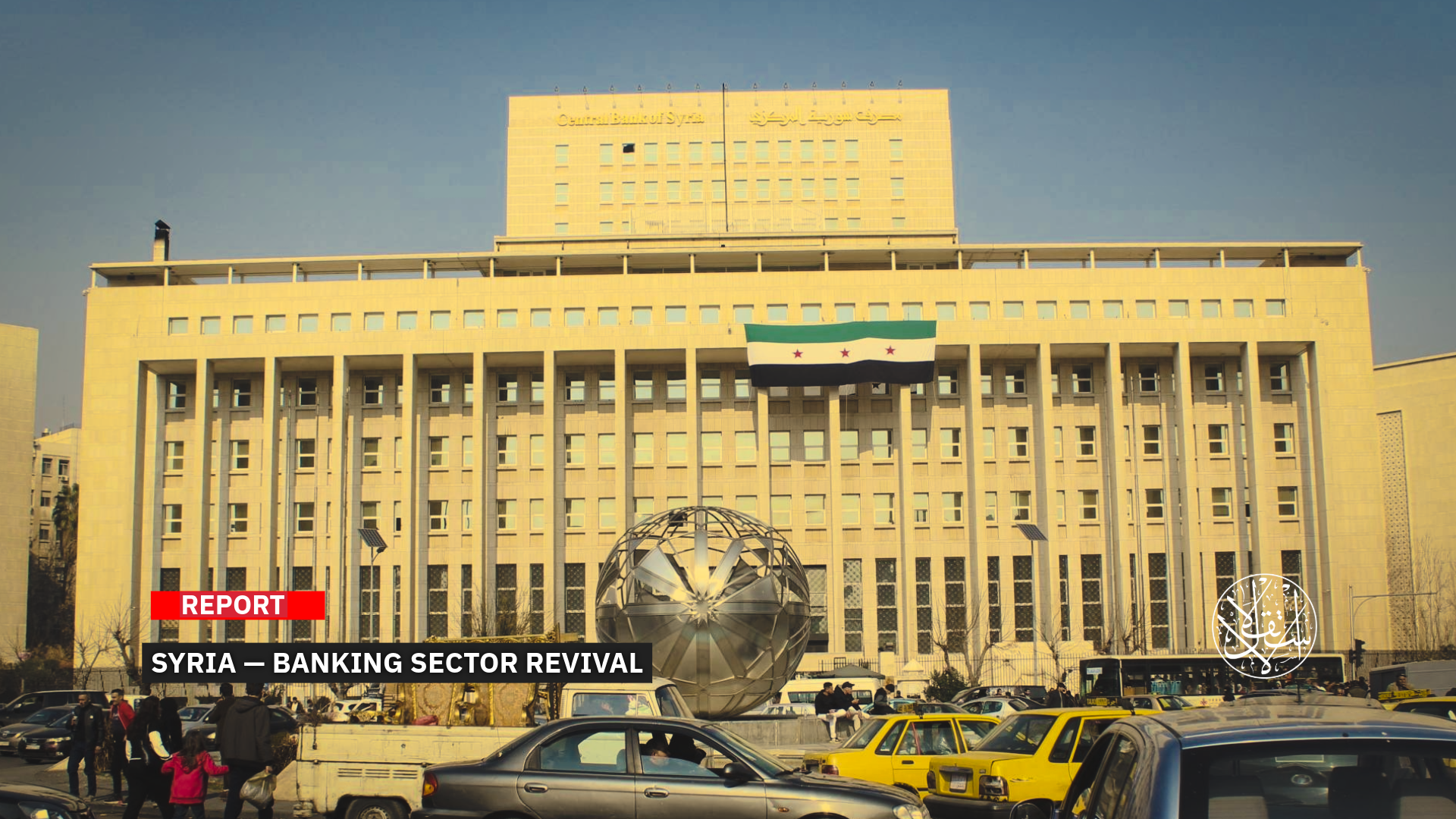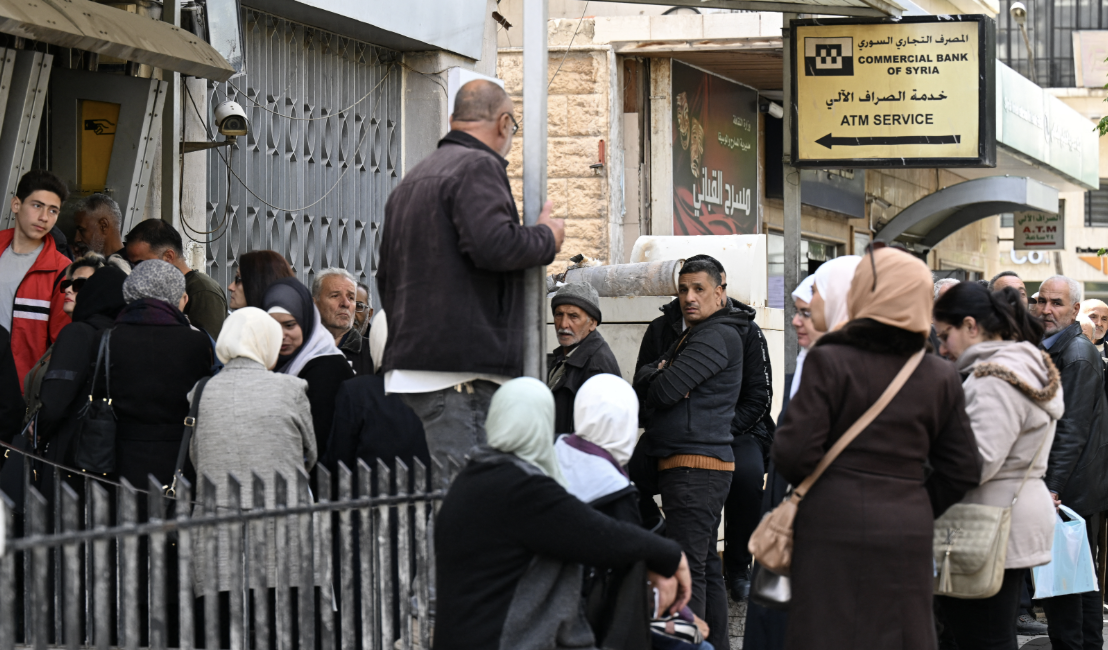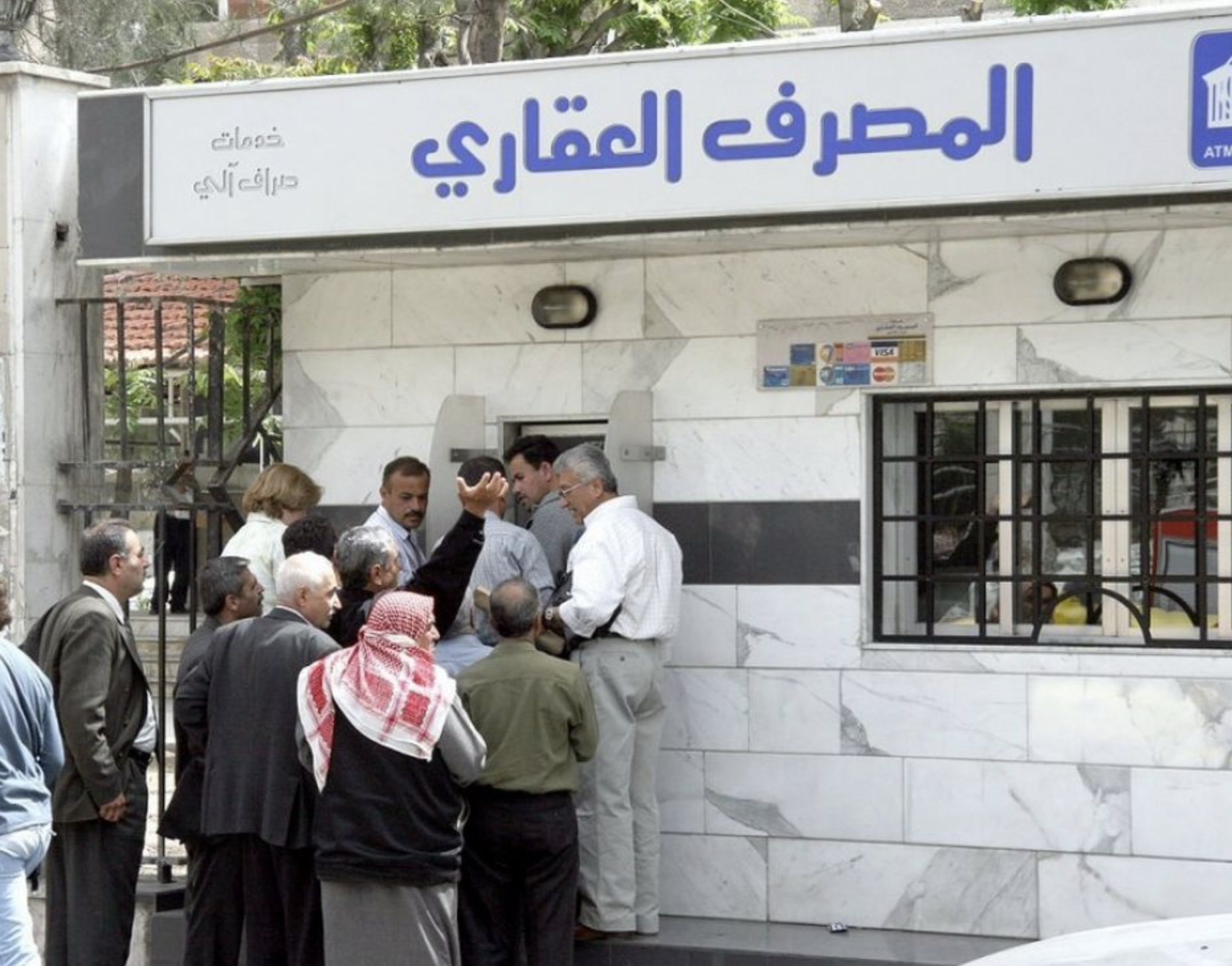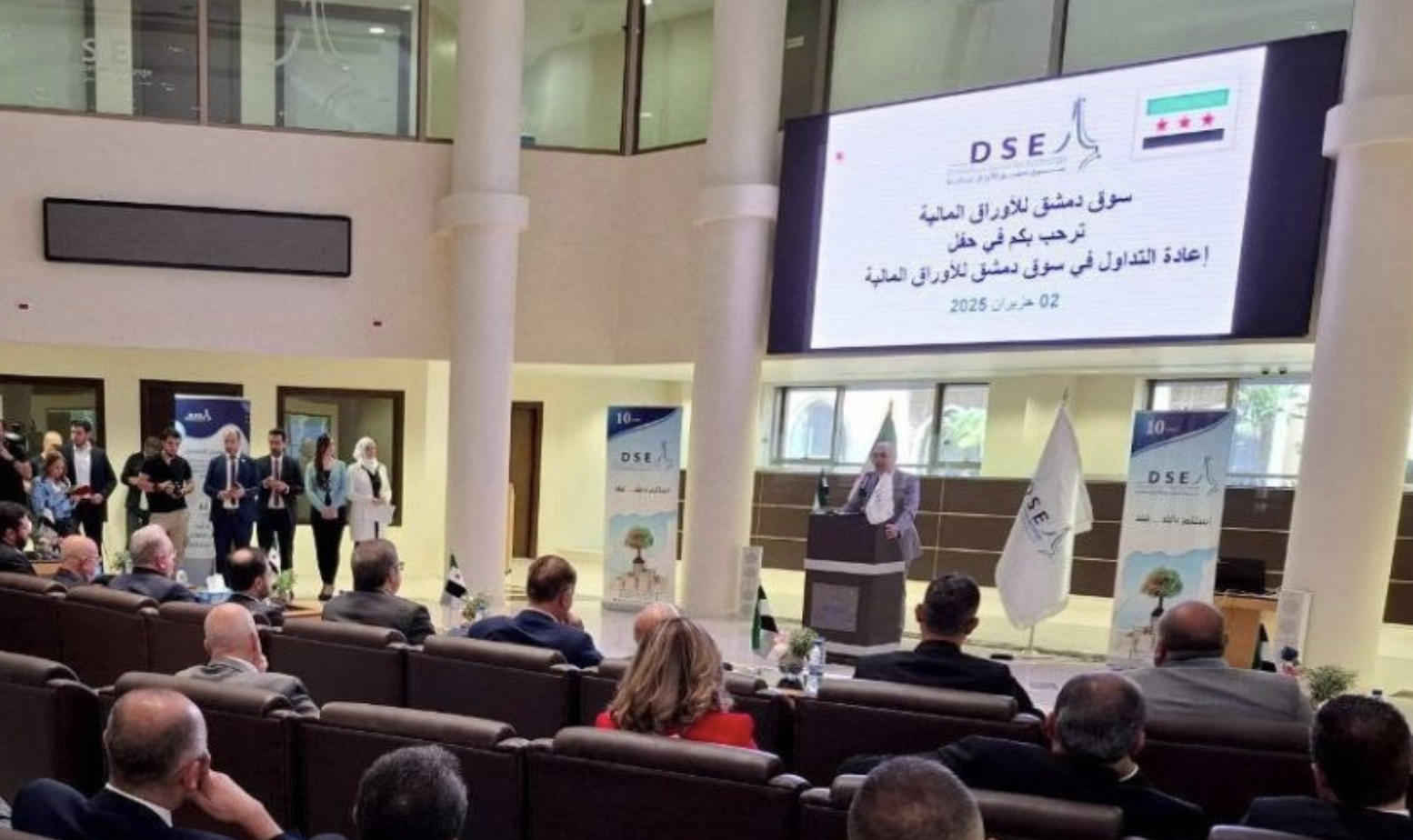From the Rubble of Collapse: Can Syria Rebuild Its Banking Sector?

Syria's banking sector has been absent from the international financial scene for nearly 14 years.
With the lifting of several Western and American sanctions on Syria, reforming the Syrian banking system is no longer a choice but a necessity for rebuilding the national economy.
The negative impacts that have plagued the financial and banking sector due to the policies of the former Bashar al-Assad regime, along with the international sanctions imposed on Syria, are still present and remain a major obstacle to reviving economic activity.
A New Framework
In response, the new Syrian government has launched significant efforts to put the banking sector back on track, correct past mistakes, enhance banking services, and adopt the latest digital technologies used globally in this field.
In a new step, Syrian officials held discussions with representatives from the Turkish Ministry of Treasury and Finance and the banking sector in Turkiye to explore cooperation in public finance, insurance, and banking. These talks are part of joint efforts to support reconstruction in Syria.
Syrian Minister of Finance, Mohammed Yassir Barniyeh, confirmed that the meetings took place in the capital Damascus on July 24, 2025, with the participation of delegations from the Turkish Ministry of Treasury and Finance, the Banks Association of Turkiye, and the Participation Banks Association of Turkiye.
Representatives from the Syrian Ministries of Finance and Interior, as well as officials from the Central Bank of Syria, also attended the meetings.
Barniyeh stated that the discussions focused on drawing from Turkish expertise to support reforms in Syria’s public finance sector, particularly in strengthening the management of public funds.
“We reviewed opportunities to benefit from Turkish experience in supporting financial reform efforts in Syria, especially in improving the efficiency of the public sector,” he said.
The talks also addressed accelerating the provision of correspondent banking services between Turkish and Syrian banks, in addition to assessing the possibility of licensing Turkish banks, insurance companies, and financial services firms to operate within Syrian territory.
At the end of June 2025, the Governor of the Central Bank of Syria, Abdulkader Husarieh, reaffirmed the bank’s commitment to reintegrating financially with the global system, emphasizing full compliance with international standards on anti-money laundering and counter-terrorism financing.
Husarieh emphasized that rebuilding trust in the banking sector is a key priority. In his view, trust will only return if the sector breaks away from past policies and regains its role in attracting deposits and supporting economic activity.
In April 2025, a technical delegation specializing in financial and monetary affairs from the World Bank visited Damascus to discuss developing and modernizing various areas of work within Syrian banks.

A New Dynamic
Syria has begun a new chapter of monetary and banking openness, marked by the gradual lifting of the long-standing isolation around its banking sector. For the first time since 2012, direct and indirect financial transfers are resuming, alongside restored access to the global SWIFT network.
The process of reintegrating the Syrian banking sector into the international financial system is already underway. This includes establishing relationships with correspondent banks, followed by issuing licenses to new financial institutions.
At the same time, the new Syrian government is working to establish a deposit insurance institution to safeguard funds held in Syrian banks.
Legislation governing the independence of the Central Bank of Syria is also being amended to ensure transparency and build trust among all relevant parties. This is considered a key step toward maintaining both financial and monetary stability.
According to authorities, Syria’s public sector employs around one million two hundred fifty thousand people. Many are forced to wait in long lines at government bank branches or ATMs.
Some even take a day off work just to try to withdraw a small portion of their salaries. The same applies to depositors attempting to access part of their savings in Syrian pounds.
In February 2025, the Central Bank imposed restrictions on cash withdrawals from banks and ATMs, pushing Syrians into a new liquidity crisis that adds to the series of economic challenges largely inherited from the Assad regime.
The Central Bank instructed public and private banks to enforce a daily withdrawal limit of two hundred thousand pounds, roughly twenty dollars per person, which may be increased if liquidity improves.
Experts stress that the presence of dynamic financial institutions capable of channeling resources into rebuilding the Syrian economy is the current top priority.
Syria’s public banking sector includes six state-owned banks. The oldest is the Agricultural Cooperative Bank, established in 1888. There are also three more recent banks specializing in commercial, industrial, and housing finance, along with two banks focused on personal lending.
The country also has eleven private banks and four Islamic banks, all of which were established between 2004 and 2023.

Comprehensive Modernization
Syrian academic and economic expert Firas Shaabo stated that the banking sector is weak and outdated, lacking the tools, capital, and expertise needed to support the country’s reconstruction phase.
Speaking to Al-Estiklal, Shaabo explained that it makes perfect sense for Syria to draw on the banking expertise of friendly and European countries, especially when it comes to updating banking laws to meet international standards, with a focus on regulating banking practices and ensuring legal safeguards.
“Tackling corruption, money laundering, smuggling, and terrorism financing is essential to secure international support for the banking sector,” he said.
“The various state-owned banks, whether industrial, agricultural, savings, or others, are currently unproductive and unable to compete, and must therefore undergo structural reform.”
Shaabo believes Syria should draw from the banking experience of Gulf countries and even from Jordanian and Lebanese banks.
He stressed the importance of financial inclusion, which would allow more people to engage with banks, encouraging banking transactions rather than cash dealings. This, he argued, helps preserve funds and liquidity within the central bank’s system.
Recently, banking clients in Syria have fallen victim to fraudulent schemes that have resulted in losses of part of their deposits. These schemes were carried out by individuals exploiting the urgent need many clients have to liquidate their funds held in banks.
The Central Bank of Syria confirmed these fraud cases. In a statement from mid-July 2025, it warned that scams typically begin with social media ads promising to help people deposit money into bank accounts via wire transfers.
After the transfer is completed, the scammers promise to hand over the equivalent in cash or internal transfers for a fixed commission. Instead, they block the clients on social media and send them a link.
Once the client clicks on the link, the scammers gain access to their account number and password, allowing them to initiate transfers from the client’s account themselves.

New Legislation
The return of the global SWIFT system to Syrian banks has allowed local financial institutions to carry out transfers without relying on intermediary banks.
However, rebuilding international trust in Syria’s banking sector remains a gradual process and requires short-term projects focused on upgrading the sector’s infrastructure and training qualified personnel.
In this regard, Firas Shaabo stressed that financial technology is virtually nonexistent in Syria, despite being a cornerstone of modern finance and business. He emphasized the importance of training staff on the latest banking systems.
Shaabo added that Syria needs new banking laws and regulatory frameworks. He suggested consulting with other countries while also opening the door to private sector participation, allowing banks to play a role in financing infrastructure and production. With a strong regulatory system in place, this could create real incentives for investors.
According to Shaabo, this would also make it possible for many investors to secure loans for their projects, especially when they already have part of the investment capital. This, in turn, would speed up Syria’s recovery and reconstruction.
He noted that there is talk of Turkish banks entering Syria, along with others from Arab and international markets. He pointed to Turkiye’s experience in controlling inflation and the tools of monetary policy, especially in supporting small and micro enterprises in remote areas.
In early June 2025, the Governor of the Central Bank of Syria held discussions with the French central bank to explore ways to modernize Syria’s monetary policy tools and enhance the independence of its central bank as a foundation for monetary stability in the current climate.
According to the Governor, those talks included potential cooperation between the two institutions in monetary policy, capacity building, and the development of banking sector expertise.
Training and education programs were also discussed, including partnerships between Syria’s banking institute and the French central bank’s international banking finance institute.
When Syria was cut off from the SWIFT system after 2011, the impact fell heavily on legitimate traders and citizens. Transfers became more expensive and had to be conducted through unofficial channels, often controlled by corrupt networks with ties to the former Assad regime.
For that reason, the Central Bank’s renewed ability to engage with the World Bank has helped curb losses in financial transfers, authorize direct remittances, and reduce reliance on informal or external networks.
On July 6, 2025, the Governor of the Central Bank described the current phase as a “historic moment” in which Syria is returning to a free-market economy. He affirmed that the country now has a rare opportunity to improve its financial sector and liberate it from the burdens that have constrained it for decades.
Sources
- Minister of Finance, World Bank delegation discuss modernization of Syria’s banking sector
- Damascus Hosts Turkish Delegation to Discuss Cooperation on Financial Reform and Banking Services [Arabic]
- Digital Transformation Is Essential for Syria’s Banking Sector to Align with Global Standards [Arabic]
- The Central Bank Warns of Fraudulent Schemes Causing Losses of Some Bank Deposits [Arabic]
- Governor of Syria’s Central Bank: Lifting Sanctions Restored SWIFT and Reactivated Transfers After Years of Isolation [Arabic]
- Al-Husarieh Discusses Cooperation and Modernizing Monetary Policy Tools with the French Central Bank [Arabic]










